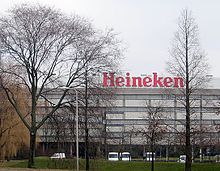Heineken: Difference between revisions
Inputoutlet (talk | contribs) No edit summary |
|||
| Line 41: | Line 41: | ||
==Production== |
==Production== |
||
{{main|Heineken_International#Brewing_plants}} |
{{main|Heineken_International#Brewing_plants|Heineken International - Brewing plants}} |
||
[[Image:Zoeterwoude.jpg|thumb|Heineken brewery in [[Zoeterwoude]]]] |
[[Image:Zoeterwoude.jpg|thumb|Heineken brewery in [[Zoeterwoude]]]] |
||
Heineken beer is brewed by 40 [[brewery|breweries]] in 39 countries around the world. 25.8 [[million]] [[hectolitre]]s of Heineken beer were produced in 2006 and the consolidated beer production was 111.9 million hectolitres.<ref name="annualreport2006">{{cite web |
Heineken beer is brewed by 40 [[brewery|breweries]] in 39 countries around the world. 25.8 [[million]] [[hectolitre]]s of Heineken beer were produced in 2006 and the consolidated beer production was 111.9 million hectolitres.<ref name="annualreport2006">{{cite web |
||
Revision as of 16:57, 18 April 2008
| Heineken logo Heineken logo | |
| Manufacturer | Heineken International |
|---|---|
| Introduced | 1873[1] |
| Alcohol by volume | 5%[2] |
| Style | Pale lager |
| Original gravity | 1.100–1.110[2] |
| IBU scale | 23[2] |
| Website | www |
Heineken is a Dutch 5% abv pale lager, made by Heineken International since 1864. It is the flagship product of the company and is made of purified water, malted barley, hops, and yeast. The beer is force carbonated. This product is a sponsor of UEFA Champions League and the Heineken Cup.
Brewing
Heineken is made of water, barley, hops, and yeast. In 1886 H. Elion finished the development of the Heineken A-yeast. This is the yeast that is still used for the beer.[1]
The brewing process is conducted as follows: First the water is purified in water tanks; then, the barley is malted in the barley tank. After one and a half days the germination starts by soaking the barley. Seven or eight days later, the malted barley is dried in a mill and seed roots are removed. The malt and the water are mixed and boiled in the mash copper and become wort. The wort is then filtered in the filtering copper. The hops are added to the wort in the wort copper and the wort is boiled again.[3] The hops give the beer the bitter taste.[4] All solid particles are removed from the wort in the whirlpool. The wort is then cooled and the yeast is added in the fermentation tank.[3] The yeast converts sugars into alcohol and carbon dioxide by fermentation.[4] After seven days the wort has become green beer, which is 4.5% alcohol by volume. The green beer matures in lagering tanks for four to six weeks, reaching 5% alcohol by volume. It is then force carbonated. The yeast is removed in the filter tank with the natural silicon kieselguhr. The beer is bottled and pasteurized to kill the microorganisms.[3]
Production

Heineken beer is brewed by 40 breweries in 39 countries around the world. 25.8 million hectolitres of Heineken beer were produced in 2006 and the consolidated beer production was 111.9 million hectolitres.[5] Since 1975, most Heineken beer is brewed in the Heineken brewery in Zoeterwoude in the Netherlands.[1]
Awards
Four awards in the early history of Heineken are mentioned on the label of the beer bottle:
- Medaille d'Or (English: Gold Medal) in Paris in 1875[4]
- Diplome d'Honneurs (English: Honorary Diploma) at the International Colonial Exposition in Amsterdam in 1883[4]
- Grand Prix (English: Grand Prize) at the Exposition Universelle in Paris in 1889[4]
- Hors Concours Membre du Jury in Paris in 1900[4]
Logo
Currently, Heineken uses a red star as part of its corporate logo.
References
- ^ a b c "Heineken geschiedenis". www.heineken.nl. Heineken. Retrieved 2007-04-28.
{{cite web}}: External link in|work= - ^ a b c "Heineken fact sheet". www.heinekeninternational.com. Heineken. Retrieved 2007-05-01.
{{cite web}}: External link in|work= - ^ a b c "The making of Heineken". www.heineken.com. Heineken. Retrieved 2007-05-08.
{{cite web}}: External link in|work= - ^ a b c d e f "Get the facts". www.heineken.com. Heineken. Retrieved 2007-05-01.
{{cite web}}: External link in|work= - ^ "Annual Report 2006" (PDF). www.heinekeninternational.com. Heineken. Retrieved 2007-04-28.
{{cite web}}: External link in|work=
